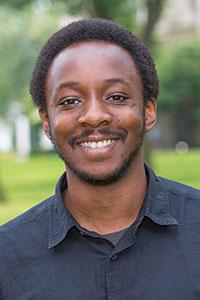非常抱歉,
你要访问的页面不存在,
非常抱歉,
你要访问的页面不存在,
非常抱歉,
你要访问的页面不存在,
验证码:

职称:Assistant Professor of Electrical Engineering and Bioengineering
所属学校:Harvard University
所属院系:Electrical Engineering and Bioengineering
所属专业:Electrical and Electronics Engineering
联系方式:617) 496-1228
Professor Ba's interests lie at the intersection of theory, computing, and data, with diverse applications that range from computational neuroscience, multimedia signal processing, and network science. He received the B.Sc. degree in Electrical Engineering from the University of Maryland, College Park, in 2004 and the M.Sci. and Ph.D. degrees in Electrical Engineering and Computer Science with a minor in Mathematics from the Massachusetts Institute of Technology, Cambridge, MA in 2006 and 2011, respectively. He went on to work as a Postdoctoral Associate with the MIT/Harvard Neuroscience Statistics Research Laboratory, where he developed theory and efficient algorithms to assess synchrony among large assemblies of neurons. In 2006 and 2009, he was a Summer Research Intern with the Communication and Collaboration Systems Group, Microsoft Research, Redmond, WA. In 2009, Professor Ba and his collaborators developed the first algorithm that could use sound to inferm the goemetry of a room. This pioneering work has numerous implications for the design of smart soundscapes and for speech enhancement systems in highly-reverberant environment. Professor Ba spent the summer of 2010 at Google where he developed novel algorithms for anomaly detection. In his research, Professor Ba develops mathematical and computational tools that leverage the inherent structure in data from artificial and natural systems. His overarching goal is two-fold: first to elucidate the principles that underlie these systems, and second to design better such systems. In applications to neuroscience, Professor Ba develops computational tools that enable his collaborators to elucidate the role of dynamic networks of neurons in phenomena such as anesthesia and sleep. In more classical applications of signal processing, he develops signal representations that exploit the structure present in natural media such as audio, images and video. More recently, Professor Ba has been interested in network science, specifically tracking the dynamics of information and behavior spread on community and social networks.
Professor Ba's interests lie at the intersection of theory, computing, and data, with diverse applications that range from computational neuroscience, multimedia signal processing, and network science. He received the B.Sc. degree in Electrical Engineering from the University of Maryland, College Park, in 2004 and the M.Sci. and Ph.D. degrees in Electrical Engineering and Computer Science with a minor in Mathematics from the Massachusetts Institute of Technology, Cambridge, MA in 2006 and 2011, respectively. He went on to work as a Postdoctoral Associate with the MIT/Harvard Neuroscience Statistics Research Laboratory, where he developed theory and efficient algorithms to assess synchrony among large assemblies of neurons. In 2006 and 2009, he was a Summer Research Intern with the Communication and Collaboration Systems Group, Microsoft Research, Redmond, WA. In 2009, Professor Ba and his collaborators developed the first algorithm that could use sound to inferm the goemetry of a room. This pioneering work has numerous implications for the design of smart soundscapes and for speech enhancement systems in highly-reverberant environment. Professor Ba spent the summer of 2010 at Google where he developed novel algorithms for anomaly detection. In his research, Professor Ba develops mathematical and computational tools that leverage the inherent structure in data from artificial and natural systems. His overarching goal is two-fold: first to elucidate the principles that underlie these systems, and second to design better such systems. In applications to neuroscience, Professor Ba develops computational tools that enable his collaborators to elucidate the role of dynamic networks of neurons in phenomena such as anesthesia and sleep. In more classical applications of signal processing, he develops signal representations that exploit the structure present in natural media such as audio, images and video. More recently, Professor Ba has been interested in network science, specifically tracking the dynamics of information and behavior spread on community and social networks.